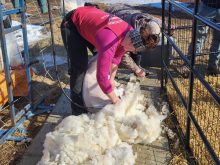In a few weeks time a group of South Korean businesspeople will be visiting Canada to observe meat processing and cattle production.
Because of foot-and-mouth outbreaks in South Korea and Japan, they will be provided with clean clothes and shoes at the Vancouver airport. Upon arrival at their hotel, all their laundry will be washed before they travel any farther into Canada.
The precautions are necessary to prevent the spread of this highly communicable viral disease of cattle and hogs.
Meat exporters are watching the situation as large numbers of animals are destroyed to prevent spread of the disease in South Korea.
Read Also

Charges laid after cattle theft
Saskatchewan RCMP lay two charges against a man after six cattle went missing.
“People are shocked to see soldiers euthanizing animals and burning buildings,” said Ted Haney, manager of the Canada Beef Export Federation. Haney left for South Korea April 10. His travel plans include Taiwan and Japan.
Exports of meat are blocked in these countries and consumer confidence in pork is especially weak, said Haney.
Japan has lost its source for 100,000 tonnes of pork usually bought from other Asian nations. This is a specialty cuisine item and is not easily substituted with imports from North America.
Japanese ranchers who produce Wagyu cattle for Kobe beef could also be hard hit. They live in the quarantined area, which may force some out of business. It could open the door for more imports of foreign beef from disease-free regions.
Haney said this latest food scare to rock Asia should be over by September at the latest.
The Canadian Food Inspection Agency urges travelers to Asia to help prevent the spread of foot-and-mouth disease to Canada.
This disease does not cause illness in humans, but can be spread by contaminated vehicles, clothes or footwear and in infected meat products.
Foot-and-mouth disease is a highly contagious livestock illness that affects cloven-hoofed animals including cattle, hogs, bison, elk, deer and sheep.
The disease causes severe production losses. Blisters occur on the nose, tongue, lips, toes, hoofs and teats resulting in severe lameness, fever, depression and loss of appetite.
CFIA requests that travelers declare all meat, dairy or other animal products that they bring into Canada. If travelers visited a farm while abroad, they should clean and disinfect their footwear and clothing. Those who have traveled in a country where foot-and-mouth disease is present should stay away from farms for 30 days after entering Canada.
Farmers and ranchers should not allow farm visits by anyone who has been in South Korea or Japan in the past 30 days. If visitors must come to the farm or ranch, they should wash and disinfect all personal effects and equipment that have accompanied them, especially footwear.
In addition CFIA prohibits the import of susceptible animals and animal products including bovine semen and embryos from Japan and South Korea.
Further information on disease status is available by calling local CFIA offices listed in the blue pages of the telephone book.

















